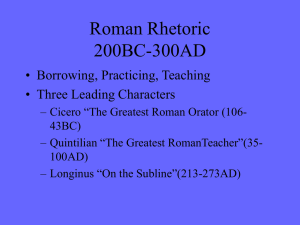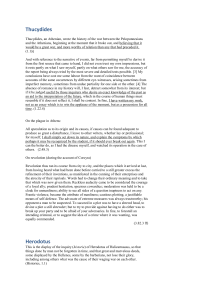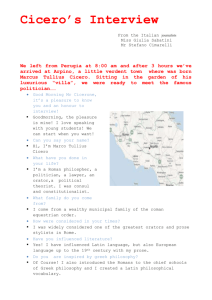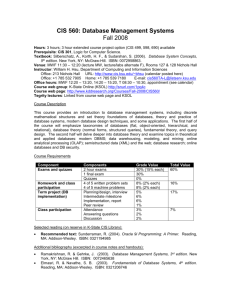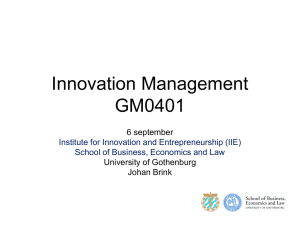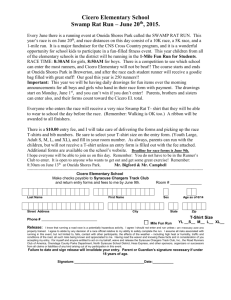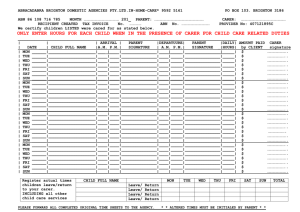Lat 205 - Vanderbilt
advertisement
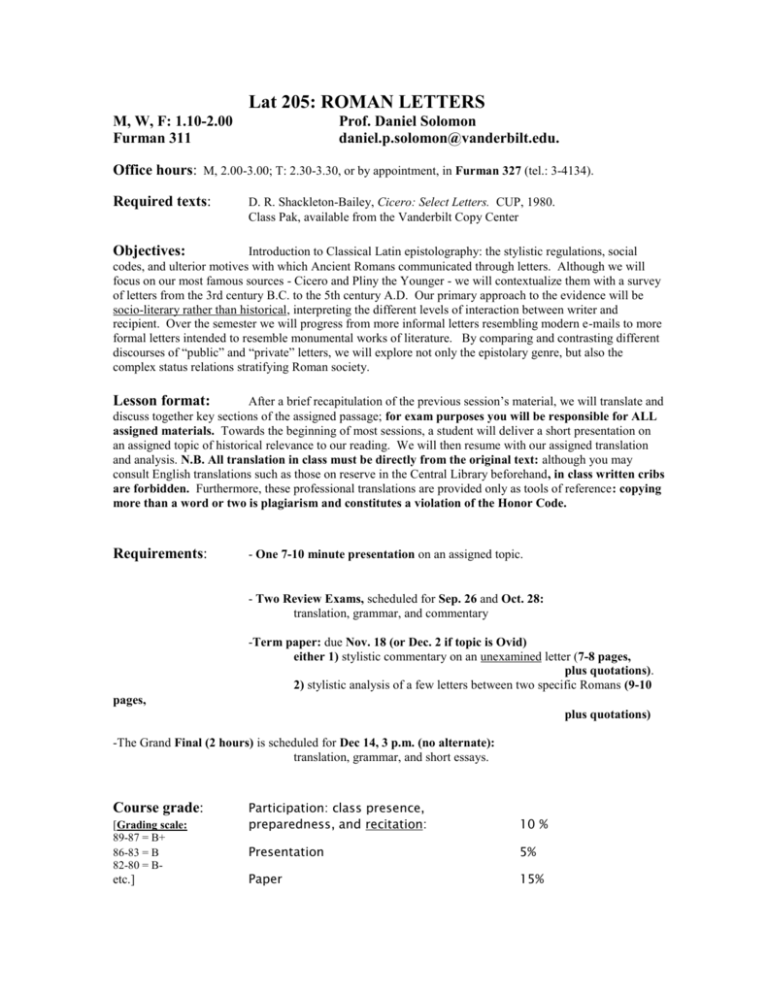
Lat 205: ROMAN LETTERS M, W, F: 1.10-2.00 Furman 311 Prof. Daniel Solomon daniel.p.solomon@vanderbilt.edu. Office hours: M, 2.00-3.00; T: 2.30-3.30, or by appointment, in Furman 327 (tel.: 3-4134). Required texts: D. R. Shackleton-Bailey, Cicero: Select Letters. CUP, 1980. Class Pak, available from the Vanderbilt Copy Center Objectives: Introduction to Classical Latin epistolography: the stylistic regulations, social codes, and ulterior motives with which Ancient Romans communicated through letters. Although we will focus on our most famous sources - Cicero and Pliny the Younger - we will contextualize them with a survey of letters from the 3rd century B.C. to the 5th century A.D. Our primary approach to the evidence will be socio-literary rather than historical, interpreting the different levels of interaction between writer and recipient. Over the semester we will progress from more informal letters resembling modern e-mails to more formal letters intended to resemble monumental works of literature. By comparing and contrasting different discourses of “public” and “private” letters, we will explore not only the epistolary genre, but also the complex status relations stratifying Roman society. Lesson format: After a brief recapitulation of the previous session’s material, we will translate and discuss together key sections of the assigned passage; for exam purposes you will be responsible for ALL assigned materials. Towards the beginning of most sessions, a student will deliver a short presentation on an assigned topic of historical relevance to our reading. We will then resume with our assigned translation and analysis. N.B. All translation in class must be directly from the original text: although you may consult English translations such as those on reserve in the Central Library beforehand, in class written cribs are forbidden. Furthermore, these professional translations are provided only as tools of reference: copying more than a word or two is plagiarism and constitutes a violation of the Honor Code. Requirements: - One 7-10 minute presentation on an assigned topic. - Two Review Exams, scheduled for Sep. 26 and Oct. 28: translation, grammar, and commentary -Term paper: due Nov. 18 (or Dec. 2 if topic is Ovid) either 1) stylistic commentary on an unexamined letter (7-8 pages, plus quotations). 2) stylistic analysis of a few letters between two specific Romans (9-10 pages, plus quotations) -The Grand Final (2 hours) is scheduled for Dec 14, 3 p.m. (no alternate): translation, grammar, and short essays. Course grade: [Grading scale: 89-87 = B+ 86-83 = B 82-80 = B- etc.] Participation: class presence, preparedness, and recitation: 10 % Presentation 5% Paper 15% Review Exams 40 % Final Exam: 30 % Select Bibliography: Adams, J. N. The Vulgar Latin of the Letters of Claudius Terentianus. Manchester. 1977 Beard, M. “Ciceronian Correspondances: making a book out of letters,” in T.P Wiseman, ed., Classics in Progress: Essays on Ancient Greece and Rome,” Oxford (2002), pp. 103-144. Birley A.R., Marcus Aurelius: a Biography. London. 2002 [ONLINE] Bowman, A.K. and Thomas, J.D. Life and Letters on the Roman Frontier. London. 1994. Brunt, P.A., “Amicitia in the Late Republic,” in P. A. Brunt, ed., The Fall of the Roman Republic and Related Essays, Oxford (1988), pp. 351-81. Champlin, E. Fronto and Antonine Rome. Cambridge. 1980. Classen, J.M., "Documents of a Crumbling Marriage: The Case of Cicero and Terentia" in Phoenix, 50.3/4 (1996), pp. 208-232 [more thorough than Grebe below, but rather long and controversial; use a critical eye here!]. Cotton, H.M. [a], Documentary Letters of Recommendation in Latin from the Roman Empire. Königstein/Ts. 1981. -----------------[b] “Mirificum Genus Commendationis: Cicero and the Latin Letter of Recommendation,” in American Journal of Philology, 106 (1985), pp. 328-334 [ONLINE]. Dickey, E. Latin Forms of Address: from Plautus to Apuleius. Oxford. 2002. Edwards, C. "Self-Scrutiny and Self-Transformation in Seneca's Letters," in Greece & Rome, 44.1 (1997), pp. 23-38. [ONLINE] Gibson, R. and Morello, R. (eds.), Re-imagining Pliny the Younger. Arethusa special volume no. 36.2 (2003) [ONLINE: please note that every single article in here is relevant to our course!] Grebe, S. “Marriage and exile: Cicero's letters to Terentia,” in Helios, 30 (2003), pp. 127-146 [ONLINE]. Griffin, M.T., “Philosophical Badinage in Cicero’s Letters,” in Powell, J.G.F. , ed., Cicero the Philosopher: Twelve Papers. Oxford. 1999, pp. 326-346 [rather technical, but a useful analysis of Cicero’s letters to Epicureans]. Hall, J. "Cicero to Lucceius (Fam. 5.12) in Its Social Context: Valde Bella?." in Classical Philology, 93 (1998), pp. 308321. [ONLINE] Hariman, R. “Political Style in Cicero’s Letters to Atticus,” in Rhetorica, 7 (pp. 145-158) [ONLINE] Harries, J.. Sidonius Apollinaris and the Fall of Rome, AD 407-485. Oxford. 1994 [ONLINE]. Hoffer, S.E. [a]The Anxieties of Pliny the Younger. Atlanta. 1999. -------------- [b} "Cicero's 'Friendly Disagreement' with Metellus Celer (Fam. 5.1-2)," in Scripta Classica Israelica, 22 (2003), pp. 93-101 Hooper F. and M. Schwartz, Roman Letters: History from a Personal Point of View. Wayne State. 1991. Hutchinson, G.O. Cicero’s Correspondence. A Literary Study. Oxford 1998. [interesting but not too popular...] Jones, N.F. "Pliny the Younger's Vesuvius Letters (6.16 and 6.20)," in Classical World, 95 (2001), pp. 41-48. Leach, E. W. “Cicero Bi-Marcus,” in Transactions of the American Philological Association, 129 (1999), only pp. 165-179 [ONLINE]. -------------- “An gravius aliquid scribam: Roman seniores write to iuvenes,” in Transactions of the American Philological Association, 136 (2006), pp. 247-67 [ONLINE]. Lindheim, S. Mail and Female:: Epistolary Narrative and Desire in Ovid's Heroides. Madison, 2003. Macleod, Colin., 'The Poetry of Ethics: Horace, Epistles 1," in JRS, 69 (1979), pp. 16-27 [ONLINE; says little about our letter but gives and excellent overview of Horace’s philosophial persona throughout Book 1 of his Epistles] Malherbe, A. J. Ancient Epistolary Theorists. Atlanta. 1988. [ONLINE] Mitchell, T. N. Cicero, the Senior Statesman. New Haven. 1991 Riggsby, Andrew M. "Pliny on Cicero and Oratory: Self-Fashioning in the Public Eye," in American Journal of Philology 116 (1995), pp. 123-135. [ONLINE] Rudd, N. “Stratagems of vanity: Cicero, Ad familiares 5.12 and Pliny's letters,” in Woodman, T., and Powell, J. (eds.): Author and Audience in Latin Literature, Cambridge 1992, pp 18-32. Sherwin-White, A.N. [a] “Trajan's Replies to Pliny: Authorship and Necessity,” in Journal of Roman Studies, 52 (1962), pp. 114-125 [ONLINE] -------------------------- [b] “Pliny, the Man and his Letters,” in Greece & Rome, 16 (1969), pp. 76-90. [ONLINE] Sivan, H. “Sid. Apollinaris, Theodoric II, and Gothic-Roman Politics from Avitus to Anthemius," in Hermes, 117 (1989), pp. 85-94. Stockton, D. Cicero. A Political Biography. London 1971. Tatum, J. The Patrician Tribune, Publius Clodius Pulcher. Chapel Hill. 1999. Traub, H.W. "Pliny's Treatment of History in Epistolary Form," in Transactions of the American Philological Association, 86 (1955), pp. 213-232. [ONLINE] van den Hout, M.P.J., A Commentary on the Letters of M. Cornelius Fronto. Leiden. 1999. [but do not get too excited...] White, C. The Correspondence (394-419) between Jerome and Augustine of Hippo. Lewiston. 1990. White, P. “Tactics in Caesar’s Correspondance with Cicero,” in F. Cairns, Caesar Against Liberty? Papers of the Langford Latin Seminar, 11 (2003), pp. 68-95. Wilcox, A. “Sympathetic Rivals: Consolation in Cicero's Letters,” in American Journal of Philology, 126 (2005), pp. 237-255 [ONLINE]. Williams, W. Pliny: Correspondence with Trajan. Warminster. 1990 Willcock, M.M., Cicero: the Letters of January to April, 43 B.C. Warminster. 1995 [though none are assigned]. In French: Berenger-Badel, Agnes, "Les critères de compétence dans les lettres de récommandation de Fronton et de Pline le Jeune," in Révue des Études Latines, 78 (2000), pp. 164-179. Jal, P. "Pline épistolier, écrivain superficiel? Quelques remarques," in Révue des Études Latines, 71 (1993), pp. 212-227. Deniaux, E. Clientèles et Pouvoir dans l’Epoque de Cicéron. Rome. 1993 [excellent on Cicero’s commendationes] In Italian: Cova, P. “Frontone contro Marco Aurelio,” in Maia, 56 (2004), pp. 510-508. Cugusi, P. Evoluzione e forme dell’epistolografia latina nella tarda repubblica e nei primi due secoli dell’ impero. Rome. 1983 [note that this is the only such survey of Latin epistolography in print today]. In German: Weische, A. 1989. "Plinius d. J. und Cicero,” in Aufstieg und Niedergang der Römischen Welt II.33.1: pp. 375-386. Ludolph, M.. Epistolographie und Selbstdarstellung Untersuchungen zu den"Paradebriefen" Plinius des J..Tübingen. 1997. Schedule of readings: Latin assignments are all to be translated, while English assignments will not only give you a context, they are also worth considering for your term paper. (“Cic.” = Cicero: Select Letters; “CP” = Class Pak) Wed Aug 24 Introduction: the hermeneutics of epistolography Fri Aug 26 the need for letters in the Roman world: CP. 1 Mon Aug 29 Cicero’s wide-ranging updates: intro to Cic. (pp. 1-17); CP. 2; Cic. 3 Wed Aug 31 Fronto’s informal updates: intro to Fronto; CP. 3 Fri Sep 2 Pliny's rather more artificial updates: CP. 4 Mon Sep 5 birthday wishes: CP. 5 Wed Sep 7 Cicero’s informal story-telling: CP. 6 Fri Sep 9 Pliny’s historical story-telling: CP. 7 Mon Sep 12 CP. 7 (concluded) Wed Sep 14 Pliny: humility of letter-writing: CP. 8 Fri Sep 16 Sidonius: safety of letter-writing: intro to Sidonius; CP. 9 Mon Sep 19 more typical letters of recommendation: CP. 10; Cic. 65 Wed Sep 21 less typical letters of recommendation: CP. 11 Fri Sep 23 letter of recommendation to a Caesar: Cic. 20; CP. 12 Mon Sep 26 Review Exam #1 Wed Sep 28 Pliny's letters to emperors: CP. 13 Fri Sep 30 Fronto's letters to emperors: CP. 14; contrast CP. 15 Mon Oct 3 request for public eulogy, Cicero: Cic, 15 Wed Oct 5 Cic. 15 (CONCLUDED) Fri Oct 7 request for public eulogy, Pliny; CP. 16 Mon Oct 10 request for public eulogy, Fronto: CP. 17 Wed Oct 12 two interactions with friends in Cicero: scholarship (Cic. 44); wit (Cic. 45) Fri Oct 14 public hostility: Cicero vs. Metellus: Cic. 4; 5.1-4 Mon Oct 17 Cicero vs. Metellus: Cic. 5. 5-10 Wed Oct 19 impatience: Cicero vs. Pompey: CP. 18; Cic. 6.4 Fri Oct 21 awkwardness: Cicero vs. Cato: CP. 19; Cic. 29 Mon Oct 24 October break Wed Oct 26 desperate for friendship: Pliny vs. Tacitus: CP. 20 Fri Oct 28 Review Exam #2 Mon Oct 31 struggle to be polite: Augustine vs. Jerome CP. 21a Wed Nov 2 CP. 21b Fri Nov 4 Cicero and his women: Cic., 9; contrast with Cic. 42-43 Mon Nov 7 consolationes: CP. 22 Wed Nov 9 CP. 22 (CONCLUDED) Fri Nov 11 "anti-consolationes": CP. 23; Cic., 56 Mon Nov 14 philosophical treatises: CP. 24 Wed Nov 16 character portrait: CP. 25 Fri Nov 18 PAPER DUE ; love letter in prose: CP. 26 --------- -------------------------- Mon Nov 28 love letter in poetry: CP. 27 Wed Nov 30 CP. 27 (concluded) Fri Dec 2 letters as a literary tradition: CP. 28. Mon Dec 5 PMich. 8.468: a private letter outside the intellectual elite Wed Dec 7 General review
